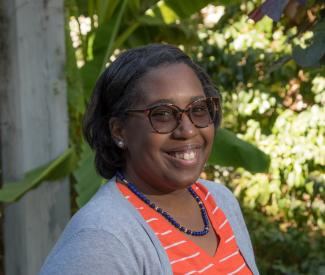
As Vladimir Putin’s threats against Ukraine culminated in a military invasion, Twitter users and news organizations turned to doctoral student in history Kimberly St. Julian-Varnon for insight. As an undergraduate at Swarthmore, St. Julian-Varnon studied Soviet and Eastern European history, then took up Ukrainian history for her master’s degree at Harvard, because, as she explains, “I just fell in love with Ukraine.” She specializes in how the Black experience shaped identity in the Soviet Union, and she lived in Ukraine while conducting research in Kyiv and Odesa.
St. Julian-Varnon has spent much of the first days after the invasion speaking out on news outlets and Twitter, where her followers grew from 9,000 to more than 87,000. She pulls no punches; one tweet said, “I will fight disinformation and Russian propaganda as Ukraine fights a murderer and his henchmen. Putin, you will choke on Ukraine."
We asked St. Julian-Varnon about the nation of Ukraine, how things got to this point, and what’s being overlooked in the discussion.
What are some things we should know about how we arrived at this moment?
It starts with the Euromaidan protests in 2013. These were in response to then- [Ukrainian] President Yanukovych not signing the association agreement with the European Union. And the idea was that he did that because of influence by Putin. So you had massive protests throughout Ukraine in support of the European Union and the association agreement. The state security forces killed a hundred Ukrainian civilians—they're called the Heavenly Hundred.
After that, we saw Russian cyber-attacks, but also Russian aggression towards eastern Ukraine. The two regions, Donetsk and Luhansk, are occupied by pro-Russian forces. In these two occupied regions—we call them oblasts—you had pro-Russian forces getting in scrimmages with Ukrainian state forces. And you've had hot war conflict in that area for the past eight years—thousands of Ukrainians have died in the occupied spaces.
But in those eight years, I think it has kind of fallen off for a lot of Americans who don't pay attention to the region. Ukraine has suffered multiple cyberattacks from Russia. A couple years ago, Russia hit the electricity grid during winter. There has been constant hacking. Last week we saw attacks on the ministry of defense, the board ministry, and the two biggest banks in Ukraine. Their websites were shut down for hours. So Ukrainians have been living with the Russian aggression for eight years. And there are horrible stories of torture camps in far eastern Ukraine.
So, we shouldn't be surprised by Russia recognizing Luhansk and Donetsk as independent. I think that's been the end game. That's been the game since 2014. But [Putin] has no right to recognize them as independent because they're still Ukrainian. [The occupied pro-Russian regions] are two smaller parts of two bigger regions called Luhansk and Donetsk and we've seen it now that they were an entry point into greater Ukraine.
In the lead up to the invasion, President Vladimir Putin described Ukraine as “historically Russian land” and said that the country was “artificially created by Soviet leader Vladimir Lenin.” Can you talk about this reference and what role history plays in Putin's motivations?
Putin is lying. Lenin did not create Ukraine. So, what [Putin] forgets is that right-bank Ukraine [Western Ukraine] was not part of the Russian empire. It was part of the Polish-Lithuanian Commonwealth and after Poland was dismembered in the 18th century, it was part of Austria-Hungary.
And so this is a territory where Ukrainian nationalism is much stronger, Ukrainian language is stronger, and the ties to Poland are strong. The religion is different. So that is not part of this whole fantasy Putin has. Eastern Ukraine, or left-bank Ukraine, has had that long connection with the Russian empire and with the Soviet Union. But Kievan Rus’, something Putin constantly talks about, is like a medieval gathering of lands—it's principalities. There was no understanding of a Russian nation at this point. This is just putting out Russian nationalism and promoting it backwards, right? It's kind of unfair for Russia to claim that as its own when Ukraine has every right to.
After the collapse of the Russian empire in 1917, you have a civil war that breaks out in Ukraine. So, eastern Ukraine, they actually have an independent Republic—Putin skipped that part. They have an independent Republic that eventually joins the Soviet Union. And when the Soviet Union is created in 1922, every titular nationality or big national group gets its own territory, the promotion of its language and the promotion of its culture. So, Ukraine got its named territory, the Ukrainian Soviet Socialist Republic. They promoted Ukrainian language and Ukrainian culture.
This is what Putin sees as an aberration. This is why he says the Soviet Union was wrong and that Lenin created it. It's because compared to the Russian empire, the Soviets promoted Ukrainian nationalism to an extent. Throughout Soviet history, you have this problem of Ukrainian nationalism always being stamped down because it's a problem for the Soviet Union. And when the Soviet Union collapses in 1991, one of the major reasons is because Ukrainians voted to leave the Soviet Union. It could not continue without the bread basket that was Ukraine.
So Putin's understanding and conception of Ukraine being Russian or being one people, it's just fundamentally ahistorical. I speak Russian, and I'm learning Ukrainian. They're not the same language. They're similar, but they're not the same. Polish grammar and Polish language are actually closer to Ukrainian. The religion is different. You do have Eastern Orthodox people in eastern Ukraine, but you have Uniate people who follow the Eastern rites, so you have an Orthodox faith that follows the Pope in Ukraine.
And Ukraine has always been a multilingual country, and this is something that's so important because Putin says if they’re Russian speakers, then they're Russian. That's not true.
Read the entire interview HERE
